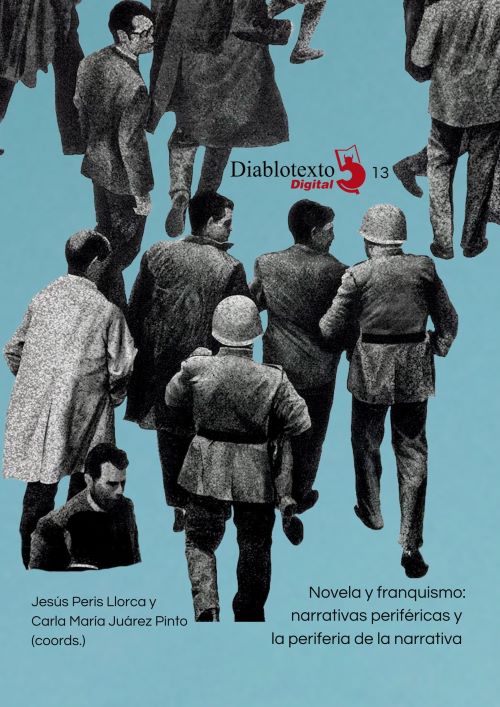Who silenced Radclyffe Hall? The Censorship of Lesbianism in 'The Well of Loneliness'
DOI:
https://doi.org/10.7203/diablotexto.13.26018Keywords:
censorship, gender, Radclyffe Hall, censors Abstract
Abstract
The behavior of Franco's censorship arouses significant academic interest. In addition to key works on its principles and regulations further works focus on the intersection between censorship, translation and gender. These aim at making the work of both domestic and foreign women writers under Francoism visible whilst promoting the recovery of censored texts. The Well of Loneliness, written by Radclyffe Hall in 1928 is considered one of the ‘bibles’ of lesbianism. However, there are fewer works that analyse censors in order to establish links between them and the censor behaviour derived from censorship reports. In this paper we delve into the actors who banned Hall's work in Spain.
 Downloads
Downloads
 References
References
Abellán, Manuel L. (1980). Censura y creación literaria en España (1939-1976). Barcelona: Península.
Abellán, Manuel L. (1982). “Censura y autocensura en la producción literaria española”, Nuevo Hispanismo (1982), 1, pp. 169-180.
Billiani, Francesca (2009) “Censorship”. En Mona Baker & Gabriela Saldanha (eds.), Routledge Encyclopedia of Translation Studies. London: Routledge, pp. 28-31.
Cerrillo, Pedro C.; Sotomayor, Victoria (2016). Censuras y literatura infantil y juvenil en el siglo XX. Ediciones de la Universidad de Castilla la Mancha.
De La Paz De Dios, Leticia (2022). La subversión a través de la traducción. Análisis de las traducciones al español de la poesía de Adrienne Rich desde una perspectiva feminista. Granada: Universidad de Granada.
Godayol, Pilar (2016). Tres escriptores censurades: Simone de Beauvoir, Betty Friedan & Mary McCarthy. Lleida: Punctum.
Gutiérrez Lanza, Camino (1997). “Leyes y criterios de censura en la España franquista: traducción y recepción de textos literarios”. En Miguel Ángel Vega y Rafael Martín-Gaitero (Eds.), La palabra vertida. Investigaciones en torno a la Traducción. Actas de los VI Encuentros Complutenses en Torno a la Traducción. Madrid: Editorial Complutense, pp. 283-290.
Hall, Radclyffe (1928). The Well of Loneliness. New York: Blue Ribbon Books.
Hall, Radclyffe (1966). El pozo de la soledad (Trad. Ulises Petit de Murat). Buenos Aires, Argentina: Hemisferio.
Hall, Radclyffe (1989). El pozo de la soledad (Trad. Montserrat Conill). Barcelona: Ultramar.
Hall, Radclyffe (2003). El pozo de la soledad (Trad. Montserrat Conill). Barcelona: Ediciones de la Tempestad SL.
Hall, Radclyffe (2014). El pozo de la soledad (Trad. Montserrat Conill). Barcelona: Ediciones La Tempestad.
Larraz, Fernando (2014) Letricidio español. Censura y novela durante el franquismo. Gijón: Ediciones Trea.
Lazcano González, Rafael. “Miguel de la Pinta Llorente”. Real Academia de Historia. En https://dbe.rah.es/biografias/9700/miguel-de-la-pinta-llorente
[Fecha de consulta: 10 de enero de 2023].
Lima Grecco, Gabriela; Martín Gutiérrez, Sara (2022). Mujeres de pluma. Escritoras y censoras durante el franquismo. Piedra papel libros.
Melero, Alejandro (2013). “La homosexualidad bajo el cine franquista: represión, censura”. Revista Clepsydra 12, pp. 107-123.
Nash, Mary (2015). “Vencidas, represaliadas y resistentes: las mujeres bajo el orden patriarcal franquista”. En Julián Casanova (ed.), 40 años con Franco. Barcelona: Crítica, pp. 191-229.
Panchón Hidalgo, Marian (2022). “Traduction et réception du surréalisme bretonnien: un engagement politique face à la censure franquiste”. TTR 34.2, pp. 95-121.
Panchón Hidalgo, Marian; Zaragoza, Gora (2023). “Recuperación (de textos censurados de escritoras”. Dictionnaire du genre en traduction. En https://worldgender.cnrs.fr/es/entradas/recuperacion-de-textos-censurados-de-escritoras/ [Fecha de consulta: 8 de febrero de 2023].
Radio Romania Internacional (2016). “Vintila Horia y el escándalo del premio Goncourt”. En https://www.rri.ro/es_es/vintila_horia_y_el_escandalo_del_premio_goncourt-15687 [Fecha de consulta: 5 de febrero de 2023].
Redacción De Valladolid (2018). La infame censura. Diario de Valladolid, 9-9-2018.
Sánchez Marín, Faustino G. (1956). “La figura intelectual del P. Oromí”. En https://www.filosofia.org/hem/dep/pun/ta005171.htm [Fecha de consulta: 10 de enero de 2023].
Seco Serrano, Carlos (2006). “Mihura y la otra generación del 27”, ABC, 18-2-2016.
Zaragoza, Gora (2017). Gender, Translation, and Censorship: The Well of Loneliness (1928) in Spain as an Example of Translation in Cultural Evolution. En Olaf Immanuel Seel (ed.), Redefining Translation and Interpretation in Cultural Evolution. IGI Global, pp. 42- 66.
Zaragoza, Gora y Llopis Mestre, Sara (2021). The Unlit Lamp: Translation, Reception and Censorship. Language and Intercultural Communication 31.1, pp. 37-54.
Downloads
Published
How to Cite
-
Abstract258
-
PDF (Español)125
Issue
Section
License
Licencia de reconocimiento de Creative Commons “Reconocimiento - No Comercia l- Sin Obra Derivada
Authors who publish with this journal agree to the following items:
The authors will keep their copyright and guarantee the journal the right of first publication of their work, which will be simultaneously subject to the Creative Commons license that allows third parties to share the work indicating its author and its first publication in the journal. The authors may adopt other non-exclusive license agreements to distribute the version of the published work (e.g., depositing it in an institutional telematic file or publishing it in a monographic volume), with an acknowledgment of its initial publication in this journal. The authors are allowed and encouraged to disseminate their work through the Internet (e.g., in institutional telematic archives or on their website) before and during the submission process, which can produce interesting exchanges and increase citations of the published work. (See Effect of Open Access)




